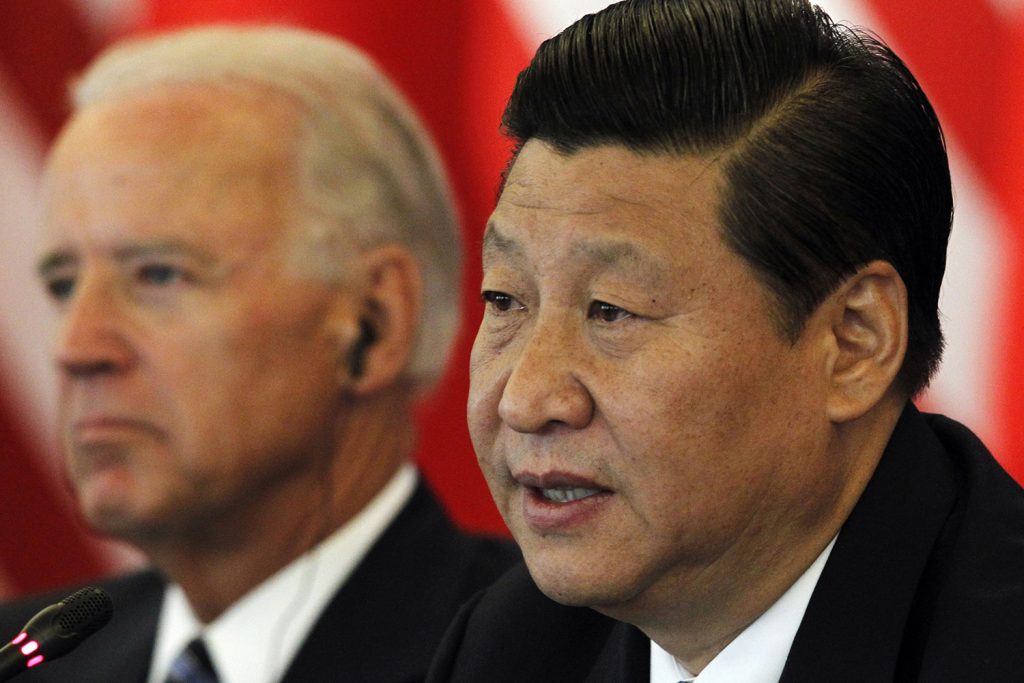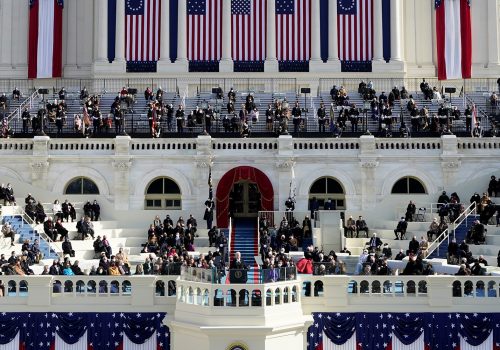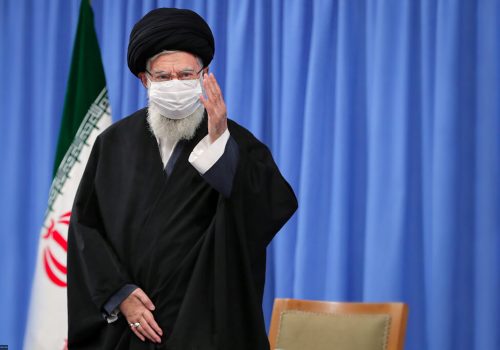It’s now Biden’s America, but whose world will it be?
Expect Chinese President Xi Jinping to answer that question unequivocally on Monday with his keynote at the World Economic Forum’s first global virtual meeting. It will leave little doubt that managing relations with China will be both US President Joe Biden’s most immediate and most defining foreign policy challenge.
It’s hard to imagine more dramatic timing for Xi’s “special address,” coming in the wake of Biden’s inaugural, former US President Donald Trump’s second impeachment, and the Capitol insurrection that prompted it.
Whatever words Xi chooses, his message will be clear: this is China’s historic moment. With modifications for global listeners, it will echo the theme he delivered a few days ago to a gathering of provincial and ministerial-level officials at the Central Party School of the Chinese Communist Party (CCP).
“The world is undergoing profound changes unseen in a century,” Xi said, kicking off a celebration-strewn hundredth anniversary year of the CCP’s creation. He declared that the “time and situation” had turned in China’s favor. “This is where our determination and confidence are coming from.”
Get the Inflection Points newsletter
Subscribe to Frederick Kempe’s weekly Inflection Points column, which focuses on the global challenges facing the United States and how to best address them.
In a relieved Washington this week, all eyes were on Biden. He sounded his determination to heal and unify the United States, and he announced his audacious move to unleash the US economy with a $1.9 trillion COVID-19 relief package and infrastructure spending bills to follow. Internationally, Biden’s focus will be on rallying democratic partners and allies to counter China’s authoritarian gambits.
Yet 2021 may instead be more the year of Xi than of Biden. The Chinese leader is leveraging the centennial of the CCP and China’s emergence as the first major economy to return to growth after COVID-19 to strengthen his individual authority, to tighten the party’s unrivaled control, and to accelerate China’s rise and increased global influence through new investment and trade deals.
At the same time, Xi is laying the groundwork for the 20th National Congress of the CCP in the second half of 2022, which could formally seal his long-term tenure as China’s paramount leader. Along the way, he has been crushing dissent and rivals, reigning in the country’s biggest private businesses starting with Jack Ma, and deploying digital and surveillance methods to assert control in a manner that he hopes will be more enduring, efficient, productive, and less violent than that of Mao Zedong.
The world won’t like all of what it sees, but Chinese officials are drawing the comparison of their economic resilience and political stability in 2020 with the dramatic dysfunctions of American democracy and the reality that the pathogen China unleashed has been far less effectively managed, and thus far more damaging, in the United States.
China drove home that narrative through this week’s announcement that the country achieved 2.3 percent gross domestic product (GDP) growth in 2020, far outperforming an expected US decline of 3.6 percent, a European Union downturn of 7.4 percent, and a global economic pullback of 4.3 percent. For the first time ever, China passed the United States as Europe’s leading trading partner through the first eleven months of last year.
Most challenging for Biden is that China has taken a series of pre-emptive steps through trade and investment deals that will complicate his efforts to reinvigorate Asian and European alliances and partnerships. These will be difficult to counter due to his Democratic Party’s reluctance to negotiate new trade arrangements and the detritus of Trump’s punitive tariffs and sanctions.
Shortly after Biden’s election in November, China signed the Regional Comprehensive Economic Partnership (RCEP) with fourteen other Asian countries. Then in December, Beijing offered surprise concessions to break a negotiating deadlock and close an investment agreement with the European Union shortly before Biden’s inauguration.
To ensure the significance of the deal wasn’t missed, Chinese Foreign Minister Wang Yi at a lunch for EU ambassadors praised this demonstration of Europe’s “strategic autonomy.”
Xi even has expressed interest in joining the higher value Comprehensive and Progressive Agreement for Trans-Pacific Partnership (CPTPP), a trade liberalization pact among Canada and ten Asian-Pacific countries that the United Kingdom is applying to join. The United States continues to suffer from Trump’s withdrawal from negotiations that created that agreement during the first days of his presidency.
Xi’s underlying message: the United States may once have been what former Secretary of State Madeleine Albright called “the indispensable nation,” but China now has become “the indispensable economy.”
Biden’s opportunity is that Xi may overplay his hand internationally through bullying and at home through an over-concentration of power. His crackdown on private business will render his economy less productive. And history is littered with examples that excessive authoritarianism is ultimately unsustainable.
The Biden administration approach to the China challenge seems to be one of urgent patience, leading with the reinvigoration of the US economy and the prioritization of alliances and partnerships.
For deeper insights, it’s worth reading the impressive recent body of work by Kurt Campbell, who Biden has brought into the White House as his right hand on China and Asia matters. Campbell sees the need to rise to the China challenge as “a rare area susceptible to bipartisan consensus” that can be leveraged to steer a path away from US decline.
With co-author Rush Doshi in Foreign Affairs, Campbell wrote in December: “Meeting this challenge requires the kinds of reinvestments in American competitiveness and innovation that are also critical to domestic renewal and working-class prosperity. Policymakers should link these two agendas, not to amplify American anxieties but to make clear that accomplishing the country’s most important domestic tasks will also have salutary effects abroad.”
As Biden’s presidency enters its first one hundred days, he can’t take his eyes off Xi’s efforts to leverage the anniversary of the first one hundred years of the CCP’s power. Biden faces a wide array of international challenges, but this contest will be the one that will define his place in history—and whether democracy or authoritarianism will be the ascendant system for the future.
This article originally appeared on CNBC.com
Frederick Kempe is president and chief executive officer of the Atlantic Council. You can follow him on Twitter @FredKempe.
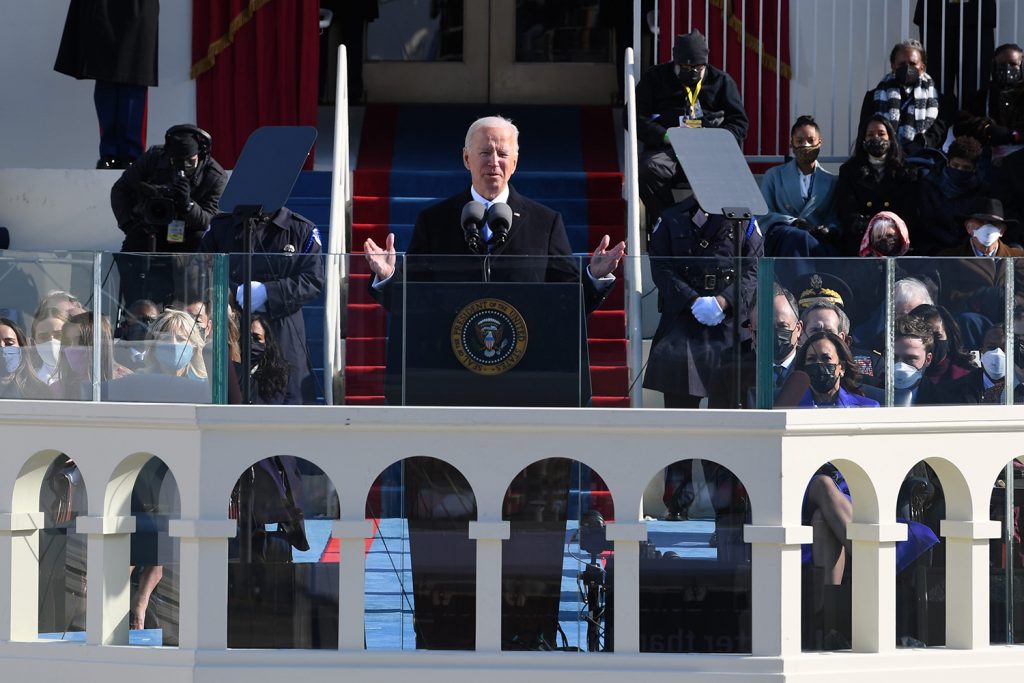
THE WEEK’S TOP READS
This week’s top reads begin with James Fallows’ reflection in the Atlantic on the “authenticity” of Biden’s inaugural address—and the text of Biden’s “America United” speech itself.
They continue with the New York Times’s David Brooks, once my colleague at the Wall Street Journal, who explains what it was about Biden’s call for national unity, which could have been “vacuous pap,” that made it so inspiring.
Greg Ip on the cover of the WSJ’s weekend review section, one of the best platforms in journalism, takes a swipe at how China won so much ground in 2020 and what it would take for an American comeback.
In Foreign Affairs, historian-strategist Hal Brands, who is always worth reading, looks at America’s hard-headed internationalist experience since World War II and why it’s uncertain whether Biden can return to that path after four years of Trump.
This week’s must-read comes from the New Yorker’s Jane Mayer, also a former WSJ colleague, who gives us a lot to digest about Mitch McConnell, now Senate minority leader, ahead of Trump’s impeachment trial. She looks at what prompted his break with Trump—and how his course now could impact the future of the Republican party.
#1. BIDEN’S “BEST VERSION”
Why Biden’s Inaugural Address Succeeded
James Fallows / THE ATLANTIC
Inaugural Address by President Joseph R. Biden, Jr.
President Joe Biden / THE WHITE HOUSE
Biden on Wednesday delivered the most important speech of his decades-long career in politics. It worked, writes James Fallows in the Atlantic, because it was authentic to Biden, “admirably plain and direct, and therefore plausible.”
Writes Fallows, speechwriter to former US President Jimmy Carter, “political speeches follow a surprisingly simple set of rules—or at least the successful ones do… Biden observed them all.” He avoided rhetorical flourishes that would have suited Martin Luther King Jr. or former US President John F. Kennedy, but not Biden.
“Joe Biden sounded like the best version of himself on Inauguration Day,” writes Fallows. “The speech’s tone matched the speaker, and thus the tone was right.” Read More →
Biden told the story of “who we are” as Americans and “who he is” as an individual. Thus, it rang true when the two came together in a single line. “Today, on this January day, my whole soul is in this,” Biden said. “Bringing America together. Uniting our people. And uniting our nation.” Read More →
#2. LET’S GIVE OPTIMISM A CHANCE
The Case for Biden Optimism
David Brooks / THE NEW YORK TIMES
In our cynical times, it was natural that many would discount Biden’s call for national unity as either impossible or political palaver or, as New York Times columnist David Brooks put it, “vacuous pap.”
So, I was encouraged that Brooks, like me, found himself to be so moved by the Biden inaugural. “We’ve been through an emotional hailstorm over four years,” he wrote. “Suddenly the sky has cleared. It’s possible America may emerge from this trauma more transformed than we can imagine.”
The reason, he argues, is the credibility of Biden himself.
“The Biden values are there: humility, vulnerability, compassion, resilience, interdependence, solidarity. Trump’s patriotism was bloated and fear-based. Biden’s is the self-confident patriotism he absorbed by growing up in a certain sort of country during the American century.”
Bottom line: let’s give optimism a chance. There’s little to lose and much to gain. Read More →
#3. WHY CHINA WON IN 2020
China Played Its Hand Well in 2020. Will It Keep Winning?
Greg IP / THE WALL STREET JOURNAL
The Wall Street Journal’s Greg Ip couldn’t have put it more plainly in his cover essay in the weekend review section:
“If the U.S. and China are strategic competitors, as both Mr. Trump and Mr. Biden maintain, then judging by the last 12 months, China is winning. Its centralized, authoritarian model has been ruthlessly efficient at mobilizing individuals, companies and government to combat Covid-19, face down foreign adversaries and deepen its technological knowhow…”
Ip declares that it would be unwise to count out the United States, which “has successfully adapted to internal and external challenges for over two centuries… Yet the past year poses uncomfortable questions about whether the American system can meet the challenge of China.” Read More →
#4. LAST GASP OR SECOND WIND?
The Last Chance for American Internationalism
Hal Brands / FOREIGN AFFAIRS
Hal Brands takes an intelligent look at one of the most compelling questions about the Biden presidency. Much as the Biden administration would like to rekindle the decades-old US tradition of “hardheaded internationalism, employing its power on behalf of a relatively cooperative, open world order,” will it be possible after the Trump years?
“U.S. allies may not come rushing back with open arms,” writes Brands, “the new president cannot simply declare that the United States has returned. Rather, Biden must update American internationalism for a new era of geopolitical and ideological rivalry and restore… the credibility of a tradition that has been badly damaged. If he fails, history may look at his presidency as the last gasp, rather than the second wind, of American internationalism.” Read More →
#5. THE REPUBLICAN PARTY’S FUTURE
Why McConnell Dumped Trump
Jane Mayer / THE NEW YORKER
The New Yorker’s Jane Mayer delivers this week’s must read on McConnell’s dramatic break with Donald Trump, what was behind it, and where it might now lead the Republican party.
With the Senate moving toward its impeachment trial of Trump, the first time it has ever tried a former president, “it’s unclear whether McConnell will truly end his compact with Trumpism,” Mayer writes. “But he and his Republican caucus could make the same miscalculation that they made in Georgia, choosing to placate the Trumpian base of the Party rather than confront its retrograde values and commitment to falsehoods.”
Conviction requires a two-thirds vote of the Senate, so an additional sixteen Republicans would have to join the fifty Democrats. That would seem a long-shot at the moment, but much depends on McConnell and where he casts his lot. The Trump era drama won’t be done until Trump’s political future is clear and his potential impact on the Republican party’s future is known.
Lots of US political history has yet to unfold. Read More →
QUOTES OF THE WEEK
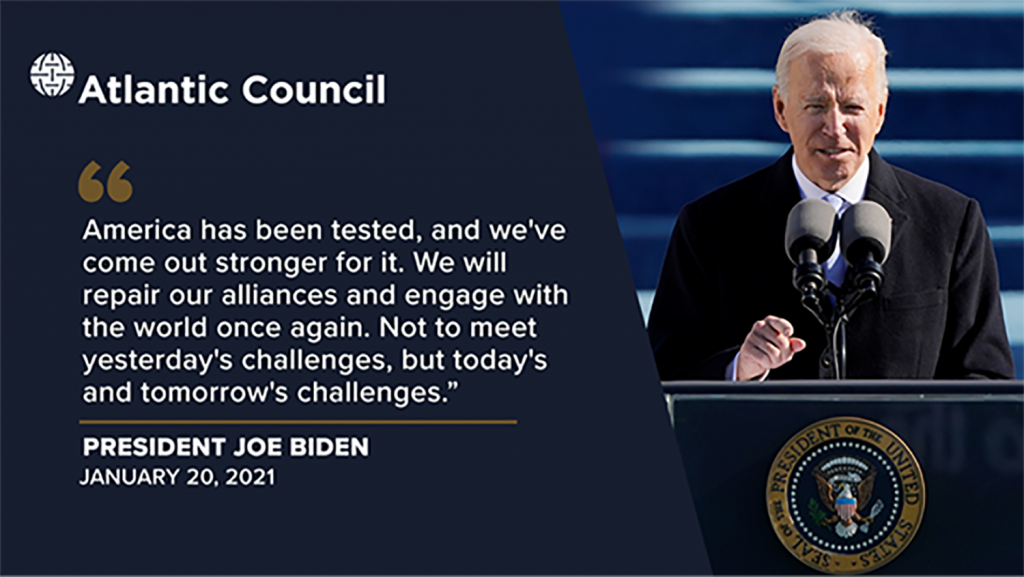
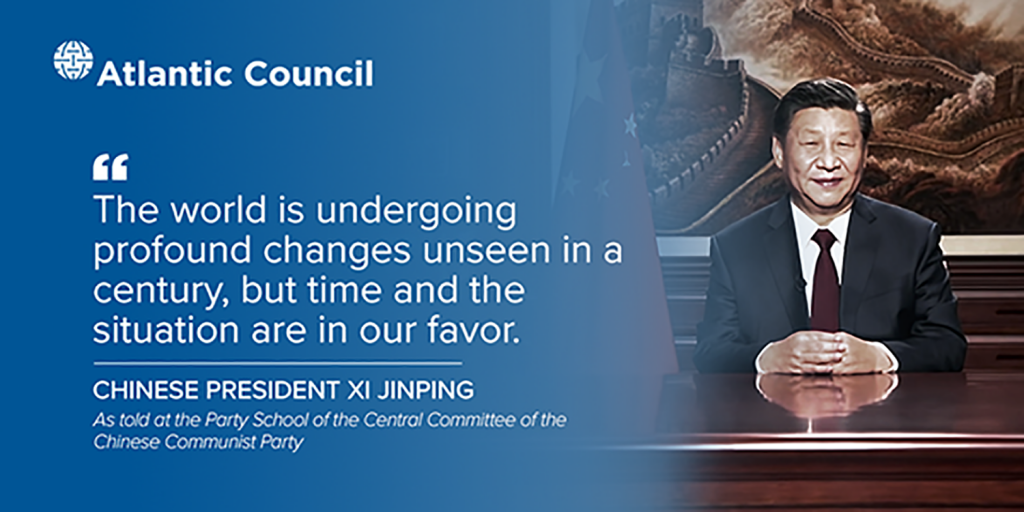
Atlantic Council top reads
Image: Chinese Vice President Xi Jinping speaks next to US Vice President Joe Biden during talks at a hotel in Beijing. REUTERS/Ng Han Guan/Pool via Reuters
